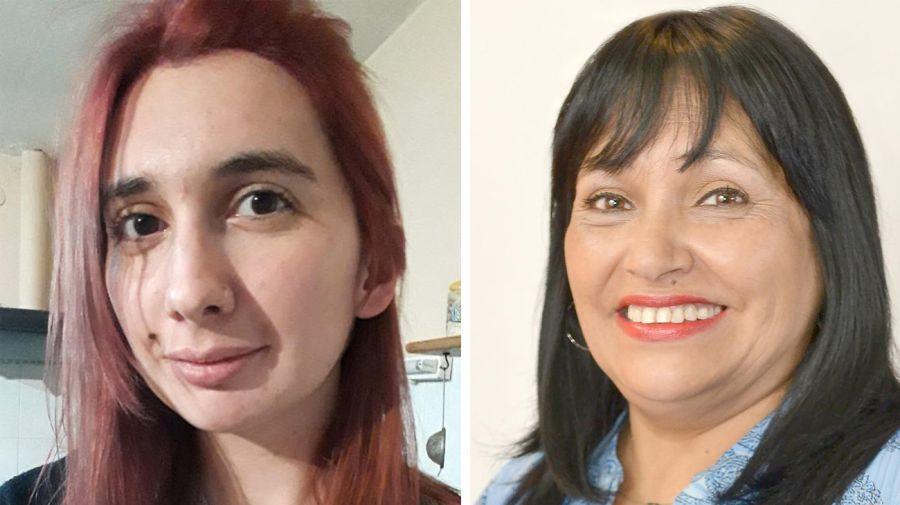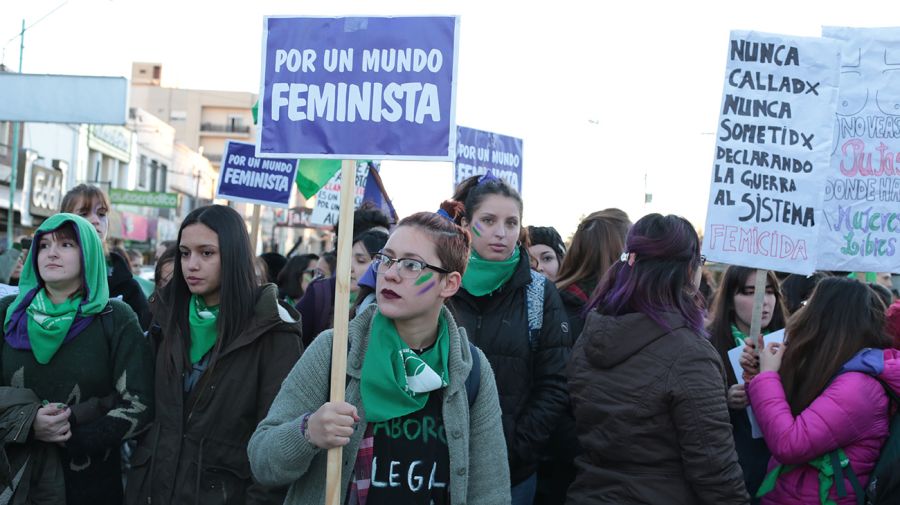Even in the middle of the night, Irina Percara’s phone is always on full volume. She never knows when she’ll need to be reached.
Irina, 24, is one of 450 activists that form Las Socorristas en Red, a network of feminist groups across Argentina that guide women through abortions using misoprostol, a drug that safely terminates pregnancies during the first trimester.
“We help women who need abortions do it without guilt, without judgment, and without putting their health and safety at risk,” the activist told the Times.
The first girl that Irina accompanied through the abortion process was a young teenager. An unemployed, overwhelmed mother of one, she lacked the financial support to raise another child.
“She did it at night, because it had to be a secret – her family was against abortion,” recalled the activist.
“I didn’t know her, and she didn’t know me, but we talked all night. I was right there, on the phone, the entire time,” said Irina. “It was all worth it. She needed to know she wasn’t alone.”
Abortion in Argentina is punishable by up to 15 years in prison, with few exceptions: when pregnancies are caused by rape, or are a threat to the life or health of the mother. Many doctors, however, are reluctant to perform abortions, even if they fit the legal criteria, because they fear criminal and social repercussions.
“This is happening especially in quarantine,” said Ruth Zurbriggen, an activist and lecturer with the Colectiva Feminista La Revuelta and founding member of the Socorristas.
“There are doctors that will refuse to see patients even though it is their legal right,” she told the Times. “And there are doctors who will purposely give women the wrong medication. They are not respecting the system – they’re obstacles to the practice, not objects of the practice.”
“And clandestine doctors sell the medication at prices that are really unaffordable,” added Irina.
Access to abortion in Argentina can be heavily determined by factors like socioeconomic status and location, making legal terminations least accessible to the country’s most vulnerable.
As a result, at least 350,000 women turn to illegal abortions each year in Argentina. International human rights groups believe the number is much higher. These clandestine procedures are often unsafe and are the leading cause of maternal mortality in the country.
“There are people who can’t afford it, and they don’t know what options they have. They do things that are so terribly dangerous,” said Irina. “It is horrible – it’s so unsafe, it doesn’t work, and it’s not uncommon that they end up in the emergency room.”

Right: Monica Menini, a feminist lawyer and specialist in Gender and Public Policy from Salta Province.
Contact and care
For eight years, the Socorristas have been steadily increasing the number of abortions that take place in Argentina’s legal healthcare system by connecting women seeking abortions to their list of allied doctors, nurses, and social workers. These healthcare workers provide medication to induce the abortion and conduct check-ups afterward to ensure the patient is healthy.
When a woman seeking an abortion first calls the network, she is paired with a volunteer, a socorrista de contacto. “Not one phone in the network is off,” explained Ruth. “We respond to everyone. We provide care quickly, and then we stay with her every step of the way.”
After pairing a woman with an allied doctor or feminist group to obtain medication, the activists offer advice on how to take it and what symptoms may occur. They remain on constant standby throughout the whole process, providing information and emotional support.
In normal conditions, the network facilitates in-person meetings between women who are also choosing to abort, where they can listen to their stories, learn more information about their choices, and find reassurance and unity in a safe space.
“There is a culture of silence and not speaking about abortion in Argentina, and it causes a burden of guilt for many women,” said Ruth. “It is so important that we speak face to face with each other about it.”
“These meetings always draw a mix,” she added. “There could be a girl who is 15, a woman who is 30 and doesn’t have children or a partner, a woman who is 45 and concerned about having children late, a woman who is 25 and already has five kids. This meeting is at the very heart of what we do.”
Inevitably, the coronavirus pandemic has made this a lot harder. Argentina has been under a strict lockdown since March 20, with citizens from leaving their homes unless they’re buying food or medicine. Residents in the Buenos Aires metropolitan area and some urban centres are still being ordered to stay home. “We had to reinvent our methods really, really fast,” said Irina.
In a world where the connection formed by in-person contact means everything, the Socorristas have been forced to carry out their work completely virtually. Adding to complications, some of the network’s allied doctors are now engrossed in efforts to tackle Covid-19, unable to provide the care they normally do.
These difficulties are further setbacks at a time when lockdowns are causing the rate of unintended pregnancies to surge worldwide. As the economic downturn continues to spiral, thousands are losing access to contraception.
“The last woman I helped in the quarantine was on the birth control pill before this, and then she lost her job from the pandemic and did not have the healthcare or the money to buy the medication,” said Irina. “She used other contraceptive methods but became pregnant anyway.”
“This is one of hundreds of stories,” she added.
And with international borders shuttered for months on end, supply chains for misoprostol and mifepristone – the medications that induce abortion – are being disrupted, restricting access for low-income nations.
Many activists believe this will lead women to seek out unsafe, clandestine abortions, making the work of the Socorristas even more indispensable.

Changing the discourse
According to the group, the network has aided roughly 32,000 women through abortions, 12.500 of which took place over last year. In just five years, they have increased their annual totals tenfold.
“That’s the principal goal – that more people can have access to safe abortions,” said Irina. “We’re growing in number, and we’re in more places throughout Argentina now. All of our activism – social media, demonstrations, word of mouth referrals – is making us more known.”
“When we have these conversations about it, and speak about it, we change the public discourse. And now it’s becoming more accepted in our society,” said the 24-year-old.
Although abortion in Argentina has been a profoundly divisive subject, there is evidence that attitudes are starting to shift. Demonstrators demanding its legalisation are growing year-on-year, with increasing numbers of public figures and politicians declaring their support for the call.
This year, the National Campaign for the Right to Safe and Free Abortion celebrates 15 years of active membership and the abortion movement’s iconic green scarf is now more visible than ever on the streets of Argentina.
“We instilled the green scarf as a symbol throughout the world, we led unprecedented generational turnout in social movements throughout Latin America, and we mobilised more than a million people demanding voluntary abortion,” Monica Menini, a feminist lawyer and specialist in Gender and Public Policy from Salta Province, told the Times.
In 2018, amid strong pressure from advocates, lawmakers impelled the Argentina’s lower house Chamber of Deputies to vote in favour of a bill to legalise abortion, though it was later defeated in the more conservative Senate.
Advocates, however, now believe they are getting closer to making history. For the first time, a sitting president, Peronist leader Alberto Fernández, has issued his backing for the cause.
Earlier this year, Fernández vowed to deliver a bill to Congress by mid-March. The legislation, however, was also hit by the pandemic, with the initiative now put on ice. It was an especially frustrating moment for activists, who once again felt they were on the verge of delivering historic change.
“When it didn’t happen last time, we didn’t give up,” said Irina. “We continued to push, and we will keep going until it is legalised,” said Irina.
Congress is back in session virtually and Fernández has declared the bill an upcoming priority. As yet, however, no date has been forthcoming. The Times reached out to the Women, Diversity and Gender Ministry but officials declined to comment.
“The legislation incorporates the decriminalisation of abortion until week 14, and imposes special penalty for each health establishment that unreasonably delays, hinders, or refuses to perform an abortion under legally authorised cases,” said Menini, who was an integral part of drafting both the 2018 and 2020 bills.
“We don’t say ‘Abortion2020’ in vain – this is a moment in history,” she added.
Ruth agrees. “I really believe this is the year it will be legalised. This is so much of what the Socorristas have been fighting for,” she said.
“We will not stop. We’re going to fight for this across all of Latin America.”





















Comments